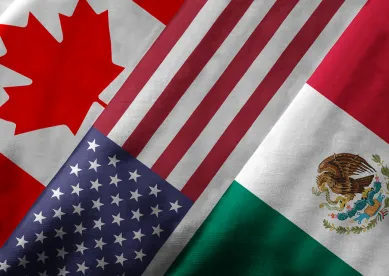Over 300 manufacturing CEOs in the United States sent a letter to the President of Mexico on April 22 asking him to align Mexico’s definition of essential businesses with that of the U.S. Department of Homeland Security’s (DHS) Cybersecurity and Infrastructure Security Agency (CISA) to minimize supply chain disruptions in North America. On April 21, the Mexican Minister of Health announced an extension of the suspension of non-essential activities until May 30, with the possibility of lifting these restrictions on May 18 for those municipalities with low or no transmission of COVID-19. The Health Ministry will define transmission metrics, along with other risk factors and vulnerabilities associated with COVID-19, in addition to processes for reducing transmission between municipalities that have differing virus propagation levels.
CISA led a call with Mr. Tom Reott, Minister Counselor for Economic Affairs at the U.S. Embassy in Mexico City, on U.S. engagement with the Government of Mexico on critical business guidance. The discussion also included a recap of the different stages of the COVID-19 outbreak in the United States and Mexico. On Tuesday, April 22, Mexico entered stage 3 of the outbreak or maximum transmission of the virus. This is particularly important to U.S. companies since Mexico’s restrictive measures on company operations affects North American supply chains, including aerospace and defense, automobile and cooling-system industries. Mr. Reott confirmed there are daily conversations with the Mexican Government toward alignment over essential business definitions, and while some Mexican restrictions might relax by June 1, there may continue to be restrictions across various states in Mexico that have continued virus transmissions. He acknowledged enforcement of restrictions on businesses has varied across the Mexican states, which has also been a challenge to U.S. companies with operations in or seeking components from Mexico.
Acting Secretary of Homeland Security Chad Wolf also participated in the DHS call, stressing the Federal Emergency Management Agency (FEMA) is leading the “whole of government, whole of America” effort to address the COVID-19 national emergency. He also mentioned that in anticipating coming out of the pandemic and restoring trade and commerce as soon as possible, he has set up a COVID-19 Secretary Advisory team to explore how to reopen in the next 30, 60, 90 days. During the Q&A with business stakeholders, CISA fielded questions related to whether guidance would be forthcoming on companies using automated temperature checking data, especially given privacy sensitivities with respect to medical information or (2) any facial recognition prohibitions, again considering privacy-related concerns, for contact tracing purposes.
Also on April 22, Mexico’s Ambassador to the United States, Martha Barcena, emphasized on a teleconference hosted by the Meridian Center that it is important to understand that the timing of the spread of the virus is different in both countries, acknowledging this is affecting the supply chains between the two countries. She further acknowledged the Government of Mexico is listening to the U.S. business community’s concerns with respect to some production of goods or components deemed non-essential that have complicated the supply chain. Again, the focus was on automobile parts and aerospace and defense components.
The Government of Mexico is currently working on developing a more efficient mechanism that allows the Government and private sector to communicate more effectively, amid managing the fast growing spread of COVID-19 in Mexico. Ambassador Barcena concluded by stressing now is a good opportunity for North America to integrate its commercial ties, saying trade needs to be regionalized within North America in a post-COVID world. This, she said, includes providing more technology support and training for Mexico. Ambassador Barcena also confirmed the Mexican Ministry of Economy is in daily contact with the Office of the U.S. Trade Representative (USTR) regarding the U.S.-Mexico-Canada Agreement (USMCA) toward an entry date target of July 1, 2020. Mexico is currently working with U.S. and Canada to coordinate the guidelines and opening processes for the automotive industry.





 />i
/>i
